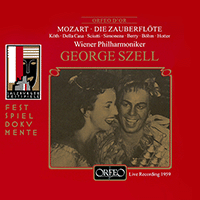Hans Hotter
Hans Hotter’s early years were spent at his birthplace in Bavaria. His father, an architect, died when he was seven, after which his mother moved to Munich with her two sons, the elder of whom was later to become a Catholic priest. Music had always been a presence in the family and Hotter succeeded Dr Josef Saam, a music professor and one of his teachers at the Maximilian Gymnasium, as organist and choirmaster at a local church. Having cherished the ambition, while still at school, to become a conductor, at nineteen he enrolled at the University of Munich to study philosophy, which included musical science. At the same time Hotter joined the Music High School to study organ, piano and singing, realising that he needed to know more about this aspect of performance. Here his singing teacher, Matthaeus Römer, hearing the potential of Hotter’s young voice, forced him to a decision as to his main study. Hotter chose singing, partly because of Römer’s faith in him, and partly because it would enable him to earn a living, so easing the finances of his widowed mother.
In 1930 Hotter joined the Municipal Theatre of Opava, in Czechoslovakia, making his debut as the Speaker / Die Zauberflöte. He moved to Wrocław for the 1931–1932 season and then to the German Theatre in Prague, after which he was a member of the Hamburg State Opera from 1934 to 1937. While at Hamburg Hotter took part in the first performance of Winfried Zillig’s opera Das Opfer (The Sacrifice) (1937). He moved to the Bavarian State Opera, Munich in 1937 at the invitation of Clemens Krauss who had heard him in Prague, and remained a member of this company for thirty-five years.
Hotter’s repertoire at this time was wide. It included the title roles in Julius Caesar (Handel), Boris Godunov and Falstaff; Pizarro / Fidelio, Iago / Otello, Escamillo / Carmen, Tonio / Pagliacci, the Count / Le nozze di Figaro, Wotan Das Rheingold and the Wanderer / Siegfried. He first sang Wotan / Die Walküre in 1941. At Munich Hotter met Richard Strauss, who, greatly impressed by his abilities, composed several roles specifically for him and which he created: the Commander / Friedenstag and Olivier / Capriccio (1938 and 1942, both Munich). Towards the end of 1939 Hotter made his debut at the Vienna State Opera as Jochanaan / Salome, swiftly followed by Julius Caesar and the Commander; he remained a member of this company until 1970.
During World War II Hotter’s career was centred upon Munich, Vienna and Hamburg. He also appeared at the Salzburg Festival, where he sang a memorable Count for Krauss in 1942 and created the role of Jupiter / Die Liebe der Danae (1944).
As soon as the war was over Hotter began to appear internationally, firstly as a member of the Vienna State Opera when it visited the Royal Opera House, London in 1947. On this occasion he sang Pizarro and the Count. He first appeared with the young Covent Garden company the following year, singing (in English) Hans Sachs / Die Meistersinger von Nürnberg. Also in 1948 he made his debut at the Teatro Colón, Buenos Aires and at the Metropolitan Opera, New York in 1950, as the Dutchman / Der fliegende Holländer, followed by the Grand Inquisitor / Don Carlo, Kurwenal / Tristan und Isolde and the Rheingold Wotan. Hotter returned to the Met during subsequent seasons, singing Jochanaan, Orest / Elektra, Amfortas / Parsifal, Pogner / Die Meistersinger von Nürnberg and Hunding / Die Walküre. His last appearance at the Met was in April 1954, as Gurnemanz / Parsifal, although he continued to appear in opera in the USA in Chicago and San Francisco.
In Europe during the 1950s Hotter dominated Wagner performance, singing Wotan in all the Ring cycles from 1952 to 1958 at the Bayreuth Festival, where he also established himself as a memorable Gurnemanz, Dutchman, Amfortas, King Mark / Tristan und Isolde and Hans Sachs / Die Meistersinger von Nürnberg. At Salzburg he appeared as Mandryka / Arabella in 1947 and as Morosus / Die schweigsame Frau in 1959. In addition to Wagner and Strauss, his repertoire also included Agamemnon / Iphigénie en Aulide, Kaspar / Der Freischütz, Cardinal Borromeo / Palestrina, the four villains / Les Contes d’Hoffmann, Méphistophélès / Faust (Gounod), King Philip / Don Carlo, Amonasro / Aida and Galitzky / Prince Igor.
During the 1960s Hotter turned to direction, between 1961 and 1964 staging the Ring in instalments at Covent Garden for Sir Georg Solti (as well as recording the Walküre Wotan and Siegfried Wanderer with him in Vienna). He also directed in Vienna and Hamburg. His last appearance as Wotan was in Paris in 1972 in Die Walküre, but he remained active for many years, for instance singing Schigolch / Lulu (1983–1989) and the Speaker (1985) at Vienna, as well as being a frequent Narrator in Schoenberg’s Gurrelieder.
Throughout his career Hotter was a fine lieder singer as well as a highly influential teacher, with many distinguished pupils. He possessed a rich, dark voice, ideally suited to Wagner, which when allied to his impressive height made him an imposing physical presence on stage.
© Naxos Rights International Ltd. — David Patmore (A–Z of Singers, Naxos 8.558097-100).


























